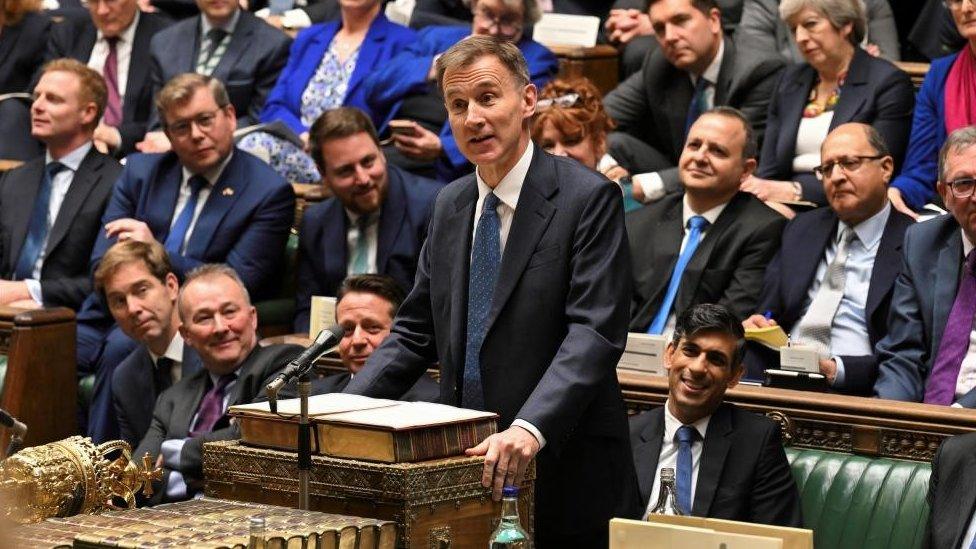Government spending plans 'a very big risk', says watchdog
- Published
- comments

Jeremy Hunt delivered his Autumn Statement last Wednesday
Spending plans outlined in the chancellor's Autumn Statement represent "a very big fiscal risk", according to the UK's official economic forecaster.
Richard Hughes, chair of the Office for Budget Responsibility, told MPs on the Treasury Select Committee that spending plans carried a level of "uncertainty".
He explained that much of the spending promised is funded by projected savings rather than income already received.
Last week, the OBR slashed its forecast for UK economic growth.
In March, the OBR said it expected GDP - a measure of the size and health of a country's economy - to grow by 1.8% in 2024 and 2.5% in 2025.
Those predictions have now been cut, with a new forecast suggesting the UK economy will grow by 0.7% in 2024 and 1.4% in 2025.
Presenting his Autumn Statement last week, Chancellor Jeremy Hunt announced tax cuts, tighter welfare rules, and further measures aimed at getting more people into work.
"It is very difficult to assess the credibility of the government's spending plans, because after March of 2025 the government doesn't have any spending plans," Mr Hughes said, as he and other members of the OBR faced questions on the Autumn Statement.
The chancellor's speech, delivered to the Commons, is the government's main opportunity outside of the Budget to make tax and spending announcements.
Bigger-than-expected cuts to National Insurance (NI) and frozen tax brackets were raised in Tuesday's hearing in parliament.
The main rate will go down from 12% to 10% from January - although previous tax changes mean many workers will not be much better off.
However, members of the OBR told the committee that the impact on economic growth from this measure was "unambiguously" positive.
While Mr Hunt announced the cut to NI rates, he opted to leave NI and income tax thresholds untouched, meaning they remain frozen until 2028.
It means that as workers secure pay rises, they may end up paying more tax if they are dragged into a higher tax band than before.
Some 2.2 million more workers now pay the basic rate income tax of 20% compared with three years ago, according to official figures, while 1.6 million more people have found themselves in the 40% tax bracket in the same period.
Prof David Miles, a member of the Budget Responsibility committee, told MPs it wasn't clear how this measure would impact growth.
"It would mean that living standards would be lower and so may mean that workers would have to do additional hours," said Prof Miles.
- Published21 February
